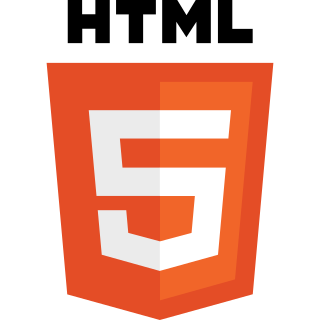
The HyperText Markup Language, or HTML is the standard markup language for documents designed to be displayed in a web browser. It can be assisted by technologies such as Cascading Style Sheets (CSS) and scripting languages such as JavaScript.
The Open Source Definition is a document published by the Open Source Initiative, to determine whether a software license can be labeled with the open-source certification mark.
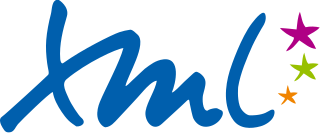
Extensible Markup Language (XML) is a markup language and file format for storing, transmitting, and reconstructing arbitrary data. It defines a set of rules for encoding documents in a format that is both human-readable and machine-readable. The World Wide Web Consortium's XML 1.0 Specification of 1998 and several other related specifications—all of them free open standards—define XML.
XSD, a recommendation of the World Wide Web Consortium (W3C), specifies how to formally describe the elements in an Extensible Markup Language (XML) document. It can be used by programmers to verify each piece of item content in a document, to assure it adheres to the description of the element it is placed in.
An open standard is a standard that is publicly available and has various rights to use associated with it and may also have various properties of how it was designed. There is no single definition, and interpretations vary with usage.
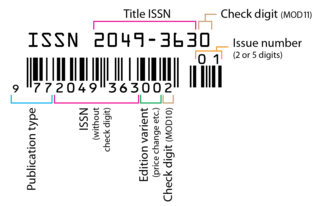
An International Standard Serial Number (ISSN) is an eight-digit serial number used to uniquely identify a serial publication, such as a magazine. The ISSN is especially helpful in distinguishing between serials with the same title. ISSNs are used in ordering, cataloging, interlibrary loans, and other practices in connection with serial literature.

A Creative Commons (CC) license is one of several public copyright licenses that enable the free distribution of an otherwise copyrighted "work". A CC license is used when an author wants to give other people the right to share, use, and build upon a work that the author has created. CC provides an author flexibility and protects the people who use or redistribute an author's work from concerns of copyright infringement as long as they abide by the conditions that are specified in the license by which the author distributes the work.

Open educational resources (OER) are freely accessible, openly licensed instructional materials such as text, media, and other digital assets that are useful for teaching, learning, and assessing, as well as for research purposes.

The Budapest Open Access Initiative (BOAI) is a public statement of principles relating to open access to the research literature, which was released to the public on February 14, 2002. It arose from a conference convened in Budapest by the Open Society Institute on December 1–2, 2001 to promote open access which at that time was also known as Free Online Scholarship. This small gathering of individuals is recognised as one of the major defining events of the open access movement. The text of the initiative was translated to 13 languages.
openEHR is an open standard specification in health informatics that describes the management and storage, retrieval and exchange of health data in electronic health records (EHRs). In openEHR, all health data for a person is stored in a "one lifetime", vendor-independent, person-centred EHR. The openEHR specifications include an EHR Extract specification but are otherwise not primarily concerned with the exchange of data between EHR-systems as this is the focus of other standards such as EN 13606 and HL7.
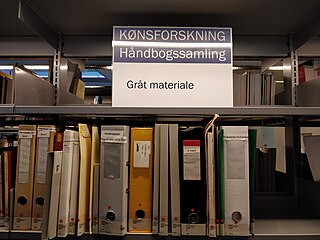
Grey literature is materials and research produced by organizations outside of the traditional commercial or academic publishing and distribution channels. Common grey literature publication types include reports, working papers, government documents, white papers and evaluations. Organizations that produce grey literature include government departments and agencies, civil society or non-governmental organizations, academic centres and departments, and private companies and consultants.
Open science is the movement to make scientific research and its dissemination accessible to all levels of society, amateur or professional. Open science is transparent and accessible knowledge that is shared and developed through collaborative networks. It encompasses practices such as publishing open research, campaigning for open access, encouraging scientists to practice open-notebook science, broader dissemination and engagement in science and generally making it easier to publish, access and communicate scientific knowledge.
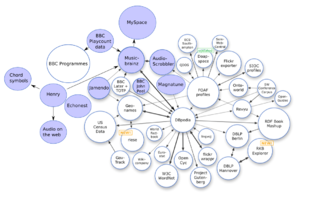
OpenData is the idea that some data should be freely available to everyone to use and republish as they wish, without restrictions from copyright, patents or other mechanisms of control. The goals of the open-source data movement are similar to those of other "open(-source)" movements such as open-source software, hardware, open content, open specifications, open education, open educational resources, open government, open knowledge, open access, open science, and the open web. Paradoxically, the growth of the open data movement is paralleled by a rise in intellectual property rights. The philosophy behind open data has been long established, but the term "open data" itself is recent, gaining popularity with the rise of the Internet and World Wide Web and, especially, with the launch of open-data government initiatives such as Data.gov, Data.gov.uk and Data.gov.in.
Open Knowledge Foundation (OKF) is a global, non-profit network that promotes and shares information at no charge, including both content and data. It was founded by Rufus Pollock on 20 May 2004 and launched on 24 May 2004 in Cambridge, UK. It is incorporated in England and Wales as a company limited by guarantee. Between May 2016 and May 2019 the organisation was named Open Knowledge International, but decided in May 2019 to return to Open Knowledge Foundation.

Free content, libre content, or free information is any kind of functional work, work of art, or other creative content that meets the definition of a free cultural work.
Crown copyright is a type of copyright protection. It subsists in works of the governments of some Commonwealth realms and provides special copyright rules for the Crown, i.e. government departments and (generally) state entities. Each single Commonwealth realm has its own distinct Crown copyright regulations. There are therefore no common regulations that apply to all or a number of those countries. There are some considerations being made in Canada, UK, Australia and New Zealand regarding the "reuse of Crown-copyrighted material, through new licences".

Metadata is "data that provides information about other data", but not the content of the data, such as the text of a message or the image itself. There are many distinct types of metadata, including:

The Definition of Free Cultural Works is a definition of free content from 2006. The project evaluates and recommends compatible free content licenses.

The Open Government Licence is a copyright licence for Crown copyright works published by the UK government. Other UK public sector bodies may apply it to their publications. It was developed and is maintained by The National Archives. It is compatible with the Creative Commons Attribution (CC-BY) licence.
Online access to legal information was implemented in France in 1999 and complemented in 2002. In that regard, France has been at the forefront of Open Data in Europe.











